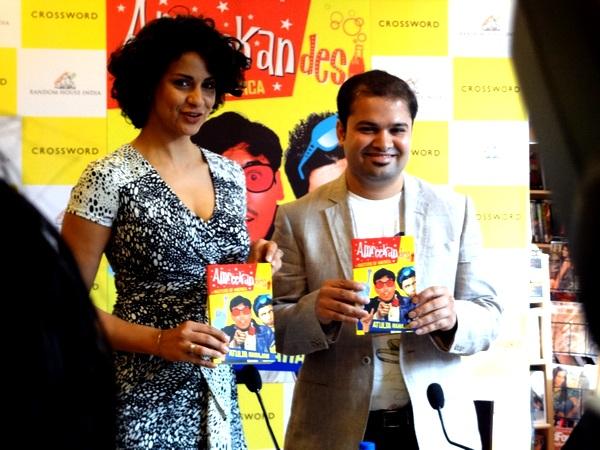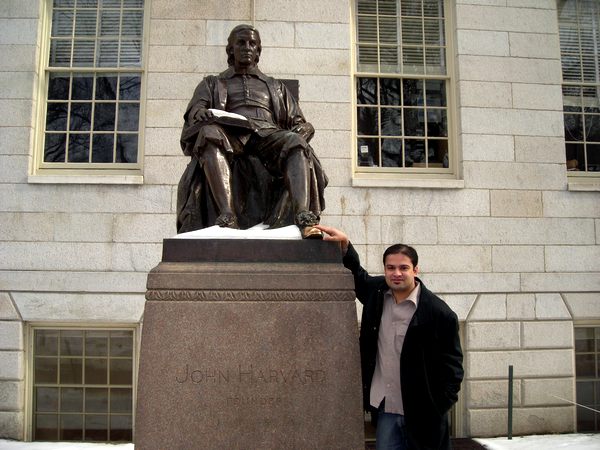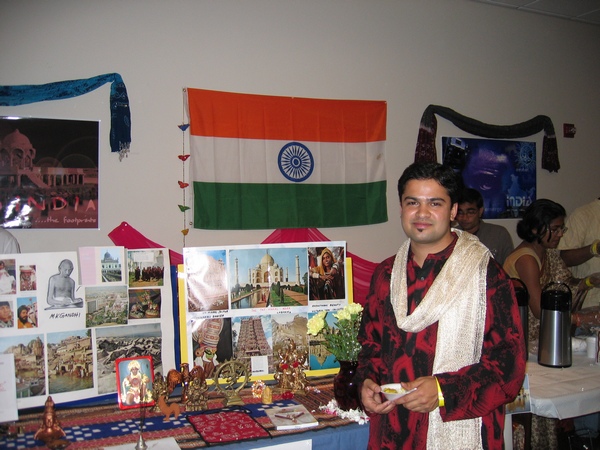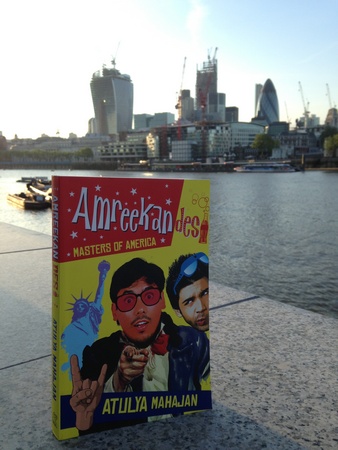
Atulya Mahajan has experienced the ordeals, quirks and preoccupations of the average Indian-American student. He speaks to Nishi Tiwari about how it became the inspiration for his debut book, Amreekan Desi: Masters of America.
Atulya Mahajan's Amreekandesi: Masters of America may be vastly different from the Diasporic literature of Jhumpa Lahiri, Chitra Divakaruni, Salman Rushdie and MG Vassanji among others but it offers hilarious, yet poignant insights into the world of the wannabe Americans.
Amreekandesi follows the tradition of Indian-American pop fiction, launched by Anurag Mathur's The Inscrutable Americans way back in the '90s.
Much like its illustrious predecessor, Amreekandesi follows the life of fresh-off-the-boat students dying to soak in as much of America as possible. It documents the ordeals, quirks and preoccupations of young students who migrate to the US to further their careers.
Partially autobiographical in tone, Amreekandesi is a story of two boys -- Akhil and Jassi -- and their journey from their middle class homes in New Delhi and Punjab respectively to Florida State University (FSU) and everything interesting that takes place in between.
A Delhi College of Engineering graduate, Mahajan did his MS from FSU. During his time in the US he noticed Indians all around him, in a setting that was as alien to him as it was to them and the different ways they responded to it.
When and why did you decide to go to the US?
Like with all other engineering graduates of my generation, after completing my four years at the Delhi College of Engineering, I had two options for higher studies – go for an MBA, or go abroad. I chose to go to America for my MS, after working for a couple of years. This was back in 2004.
In hindsight, maybe I should have done an MBA. It seems to be the entry criteria to be a bestselling writer these days.
What do you think of the current crop of business managers-turned-writers?
It's a mixed bag probably.
I believe that they are experimenting with new thoughts and bringing more variety to lighter reads.
It has also resulted in more people reading too. On the other hand, critics say that we're not professional writers.
But it's different. It takes time to mature. So when I write my second book, it should be better than the first one.
The writing improves, it gets better with time.
In the end, it's good for the reader and for people like me who've found an outlet for their thoughts.
What were the days leading up to your trip to the US like? What kind of preparation did you go through?
It was a bit of an emotional rollercoaster. Luckily my job required me to live for a little bit in Mumbai and then Hyderabad. Before that I had never lived outside home.
My parents were scared about how I was ever going to survive in a foreign land. When I wasn't busy convincing my parents that it was going to be alright, I was excited and looking forward to this new experience.
In terms of preparation, there were discussions with seniors who were already in US universities, enduring obnoxious neighbours and their worldly advise to my parents about how I was going to turn my back on them, going through Internet checklists of stuff to carry along, including about two dozen sets of underwear, because you do your laundry about once in two weeks. Gosh, it just sounds so dirty, but this is what we did).
Please
You can purchase a copy of Amreekandesi: Masters of America here!

Indians who move to the US, temporarily or for good, often leave out the uncomfortable/unpalatable bits while recounting their experience to friends and family back home -- the struggle, the identity crisis, and the quest to fit in, alienation and so on. What was your own experience like?
The uncomfortable bits are the sense of loneliness you feel when living so far away from home, in a new country.
The identity crisis is probably the biggest issue while living abroad, and this book is in large part about how people deal with it, of how they go about trying to fit in.
One of the heartbreaking aspects of life abroad is the farewells, when you get dropped off at the airport after the annual trip.
You know you won't see your family for a year (or more), and you leave with a heavy heart.
I guess I was like Akhil from the book -- focused on studies and grades. I didn't really have much time for socialising.
Overall it was a nice experience learning the culture and how things are done in America. I found Americans far more inclusive towards foreigners, as compared to how Indian people behave with other Indians of different regions or states.
As for Indians, very often they would just tend to stick together in their own groups, finding solidarity in each other's company.
Not just Indians, but all international students typically form their own little groups.
The big US universities are almost mini-versions of the UN, with their diverse student bodies.
What were the challenges you faced as a 'fresh off the boat' Indian in the US?
Often, some very basic things like how to cross a road, especially because you're scared of their law-enforcement.
In India, you can cross a road anywhere assuming you don't get run over by a car and die amidst strangers who would not dare take you to the hospital. You can't do that in America.
Nobody wants a few hundred dollars in fines for jay-walking, especially today with the dollar being Rs 60. I doubt any bank would give a loan for paying a fine.
Did you ever, at any point during your stay in the US, think of staying back?
I had always planned to eventually return. Life in the US was fun, but I have this patriotic streak about me and I'd rather roam around free in my own country than live in an alien land waiting for the elusive green card to come through.
Please

What were your first impressions of fellow Indian in the US when you first got there?
When I first landed, I was delighted to find that you got all sorts of frozen Indian food through Indian stores. Being a Punjabi foodie, that took care of my homesickness. Apart from that, I was happy to see that there was a significant Indian community that provided good support to each other.
Then there were the accents. Some got American accents overnight, almost as soon as the immigration officer stamped their passports.
It gets really funny when an oblivious boy with a thick Punjabi accent tries to force an American accent. A bit sad really, but funny as well.
Over a longer term, I noticed that people really change when they get there. Some just go crazy and only chase girls and parties. Some others spend their time saving each dollar they can. The dollar is evil. It makes people do funny things.
What would you say you learnt about America only after you got there?
When a stranger sees you walking on the road, they'll smile at you and wish you good morning. Such politeness is rare in India. I also learnt that a haircut costs $14, and on top of that you need to give a tip, or you won't be welcome the next time. I had half a mind to let my hair grow long and get a haircut the next time I went to India.
Then a lot of concepts around discipline and manners that we Indians are oblivious to, like not interrupting someone in the midst of something, standing in line for a bus, and saying hello to people servicing you like at Subway/McDonalds else they get offended!
Did you meet a lot of people like Jassi in the US?
Jassi and Akhil are two extremes that I have shown in the book. Jassi is only focused on girls and Akhil only on studies.
In reality, it isn't always black and white.
I'd say there are a lot of people who combine traits of Akhil and Jassi both, and I have seen plenty of such characters, as well as a few Jassis who spend their days dreaming of rolling in the hay with pretty American girls.
Please

We are in an age where we juggle two worlds -- work and home -- and the boundaries between them get even more defined if you live abroad. Does it change after a while or remain the same?
Perhaps. In India, quite often work ends up becoming our life, and people have close relationships with their colleagues, who would possibly be their only friends, given we spend most of our time at work.
In the US, it's a bit different. Firstly because work places are not so punishing and people get to enjoy some work-life balance.
Secondly, it becomes harder for a lot of Indians to take work relationships to a more personal level when it comes to American colleagues, perhaps due to the cultural barriers, which is where that sense of loneliness comes in.
Once you are out in the working world, it becomes quite hard to make new friends.
How did your experience in America change you?
I got to see the other side of professionalism which is very different from India.
Their way of life is professional too -- they believe in keeping their word while Indians are largely indifferent to such things.
Here, people say one thing and do another while in the US they deliver what they promise.
That was my biggest takeaway from there.
But you miss home more when you're away from India and realise that there are some good things too about it. That you've taken some things granted.
Do you feel the urge to go back?
I'd be lying if I say that thought has never crossed my mind. While America is the land of resources, I feel I am still happier living in India, despite all its shortcomings. It is my country, and I belong here. If anything, I'd rather work for the betterment of things here.
I was born on August 15, India's Independence Day. Perhaps that has something to do with the patriotic feelings.
Popular culture, for the most part, dictates how we perceive young Indian Americans.
What is a young Indian American like according to you?
Smart, intelligent, likely slogging their backsides off for the Spelling Bee, aspires (or parents want her) to become a surgeon, has to work doubly hard to ascertain their place in American society due to the cultural conflict.
I suppose all those years of being referred to as ABCDs also led to the fascination with the Spelling Bee contest. God, I am going to be lynched for using that (ABCD) term.
Please

What misconceptions about American life do Indians have?
I think we still have that thing that American culture is all bad and an evil influence, while we continue to pick all the unhealthy bits from them while ignoring the positives.
For example, American kids are brought up to be independent. Our kids pretend to be independent while driving the Audi their dad bought them. America is not all about sex and drugs as it is made out to be.
Also, it is a far less racist society than India. We are really many nations inside one, with only a few national icons like Sachin Tendulkar, Amtiabh Bachchan and Rahul Gandhi uniting us.
Talking of misconceptions, I am reminded of the Bollywood movies of the 70s, where nervous parents made their boys travelling abroad promise that they would not marry an American girl -- as if American girls are all lined up to marry Indian FOB (fresh-off-the-boat) boys.
Your comments on the American education system
It taught me a lot. Their educational system is much more application oriented, and you focus on learning, not vomiting pages of theory on examination answer sheets like in India.
The interactions with people from various cultures open up your mind and broaden your horizons.
It makes you a more rounded individual. Besides, all that dollar conversion to rupees helps improve your mental math skills by an order of magnitude.
To an Indian youth who has never ventured out of the country and is growing cynical about it by the day, what are the good things about India you'd point out?
We need to restore faith because good things are happening too. We don't hear about it because we like to sensationalise things.
The country is running because of a few good people and their good work. I know it because I've seen up close.
My parents were in government services. They did their job well and did a lot for society too.
Your blog (he blogs at Amreekandesi.com) is quite popular too. How did that start?
On one of my India trips, I had a long discussion with the Pakistani cab driver who was dropping me to the airport. That interaction made me wonder about the sort of things Indian people go through, and how all immigrants live similar lives with the same concerns and worries.
That's when I decided to start writing about the sort of issues Indians abroad go through, and the blog was born. Since then I diversified into politics, current affairs and satire.
Another book in the offing?
I do intend to continue writing. The next book will likely be a sequel that covers some more aspects of the American dream.
I hope to get started in a few months. Till then I will keep spamming my readers with updates about this one. Not going to stop till they all give up and buy themselves a copy.
You can purchase a copy of Amreekandesi: Masters of America here!